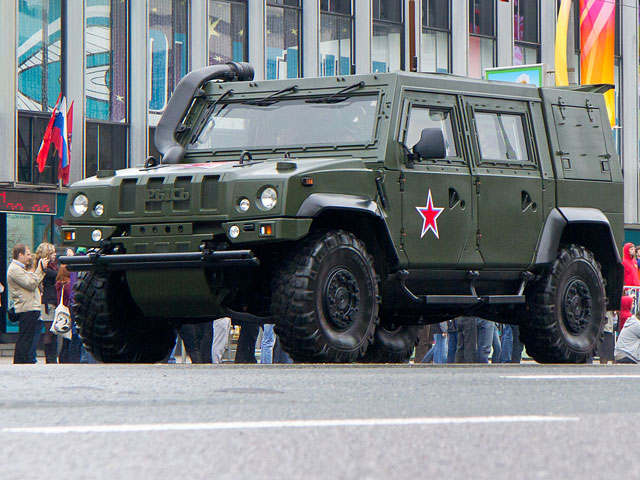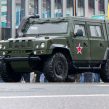
Russia Is Isolated Politically and Technologically as Relations with West Worsen
Publication: Eurasia Daily Monitor Volume: 10 Issue: 13
By:

Colonel General Vladimir Chirkin, the commander of the Russian ground forces, told journalists this week of Moscow’s decision to cancel the contract with the Defense Vehicles division of the Italian corporation IVECO to buy its LMV M65 light armored vehicle. The LMV M65 was produced in Russia in Voronezh under the local brand name Rysz, using Western-made components and armor. A contract to produce 1,775 LMV M65s, reportedly worth $1.5 billion, was signed in 2011. Together with the contract to buy French-made Mistral-class helicopter-carrying assault ships, these were pioneer projects of former Defense Minister Anatoly Serdyukov to modernize and Westernize the Russian military and defense industry using foreign armaments and technologies. Serdyukov reportedly planned to procure additional IVECO LMV M65 armored vehicles. The Russian defense ministry also leased for intense testing several Italian heavy Centauro B1 armored vehicles, considering a possible future purchase. Now, according to Chirkin, the Russian army will “reverse the decisions made by the ousted military leadership and politely return the Centauro B1 light tanks without buying them.” The previously signed contract to procure LMV M65 armored vehicles will be, according to Chirkin, honored to avoid paying penalties, but there will be no further purchases and, apparently, all efforts to localize the production of LMV M65 using Russia-made components will be abandoned. According to Chirkin, the Russian military will in the future procure Russian-made armored vehicles based on the Tiger model, produced in Arzamas by the “Russian vehicle” company (Kommersant, January 24).
The Iveco LMV M65 is used by many European armies and has been successfully deployed in Iraq, demonstrating a capability to withstand roadside bombs, due primarily, to the use of modern ceramic armor. The Russian-made Tiger armored vehicle also uses some Western-made components, but its armor plating is much weaker and ceramic armor is not, at present, produced in Russia. At the same time, the Tiger armored vehicle can carry more weapons than the LMV M65. The factory in Arzamas that makes the Tiger and hopes to sell the Russian military other armored vehicles is owned by the billionaire tycoon Oleg Deripaska (Kommersant, January 24). Last month at an inaugural meeting of a governmental council of Russian private defense contractors in Moscow, chaired by Deputy Prime Minister Dmitry Rogozin and attended by Jamestown, Deripaska announced: “There is no place for foreign investors in the Russian defense industry.” According to Deripaska, the recently reinforced Russian law on state secrecy makes it impossible to have a foreign national in a Russian defense industrial plant: “They [Russian authorities] will arrest him the next day.” Since foreign investments are not forthcoming, Deripaska demanded the government must provide the Russian private defense industry with massive subsidies; low interest, long-term loans; and massive procurement contracts.
After the fall and disgrace of Serdyukov, Deripaska and others in the Russian defense industry may see things turning their way. Sergei Shoigu, who replaced Serdyukov last November as defense minister, seems to be reversing his predecessor’s policy of procuring Western-made defense equipment. New contracts with European companies will not be signed and existing ones will be either trimmed or terminated. Last month it was announced that two Mistral-class helicopter-caring assault ships will be built in France for the Russian navy in accordance with the contract signed in 2011, but the production of two more Mistral-class ships that were planned to be built in Russia under a French license, will be postponed until 2016. According to sources in the defense ministry, before the production of the Mistral-class ships in Russia begins, “the navy must assess their capabilities, role and usefulness” (RIA Novosti, December 21, 2012). According to other reports, quoting informed government sources, the announced “postponement” will eventually lead to the cancelation of the deal. The contract to procure two French-built Mistrals did cost some $1.5 billion, while the contract to build the two additional Mistrals in Russia is still an option and not a solid deal (Vedomosti, December 21, 2012).
Shoigu has reportedly reversed another of Serdyukov’s decisions and ordered the mass production of the BMD-4M “Bakhcha” airborne armored vehicle for the Russian Airborne Troops (VDV). The BMD-4M “Bakhcha,” made in Kurgan, is lightly armored and can be deployed using a parachute, while armed with a 100-millimeter gun, capable of firing guided, long-range anti-tank missiles. The commander of the VDV, Vladimir Shamanov, has been lobbying to procure the BMD-4M, but under Serdyukov, the defense ministry refused, believing this aluminum tank is helpless against roadside bombs and too vulnerable in anti-guerrilla or urban warfare. The VDV was offered the IVECO LMV M65 instead, but now Shamanov has told journalists: “We will get what we believe we need” (Rossiyskaya Gazeta, January 24).
The procurement of the BMD-4M “Bakhcha” makes sense, if the VDV is still planning to be massively deployed by parachute far behind enemy lines in a major war in Asia or Europe—the role that the VDV was initially created to perform during the Cold War. This and other recently announced changes in procurement policy coincide with an overall change in Russia’s internal and foreign policies that are becoming increasingly anti-Western and isolationist. Reportedly, a new Russian foreign policy concept drafted by the foreign ministry has been sent to the Kremlin last November, but President Vladimir Putin has refused to sign it and demands it be rewritten to make the language decidedly more anti-American and anti-Western. Putin sees the United States and the West in general as a hostile force that is actively conspiring to organize regime change in Russia by supporting a pro-democracy opposition movement and promoting human rights. The US Magnitsky Act was adopted in mid-December and bars entry to the US of Russians accused of involvement in the death in custody of anti-corruption lawyer Sergei Magnitsky and other alleged rights abuses. However, the legislation is seen in Moscow as an unwarranted intervention in Russian internal offers and a direct challenge to Putin’s personal power (Kommersant, January 24). It seems the Russian reaction to the presumed threat coming from the West and the US will be not only rhetorical or diplomatic, but also military—reassessing possible threats, rewriting defense plans and changing the country’s procurement policy to become more isolationist.




